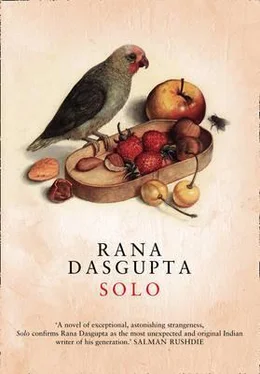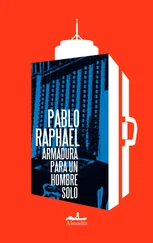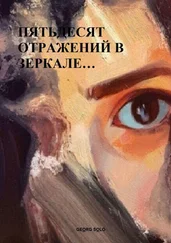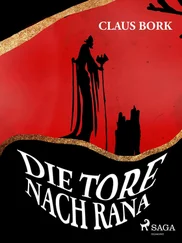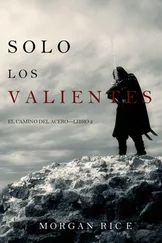The meal was already laid out, and people made for the soup, which was good and hot. A photograph of the departed woman was displayed and garlanded on a table, and the bare planks of the walls were newly covered over with pleated cotton panels, pinned at top and bottom. Ulrich found himself seated between the priest and an unknown cousin of the deceased. Her face was a force field of wrinkles, and she eyed him between mouthfuls.
‘You have the eyes of your father,’ she said. ‘I would recognise you anywhere.’
Ulrich nodded politely. She said,
‘He went years ago. Isn’t that right?’
‘Yes.’
She asked about it, and Ulrich told her what he remembered. Tears came into her eyes as he spoke.
‘We lost so many men,’ she said. ‘And many of the ones who remained were lost, if you understand me.’
‘He wasn’t himself in his last years. He was deaf and withdrawn. He didn’t know what was going on around him. The day my son was born, we smoked a cigar together outside the hospital, and he asked me who was sick.’
She said gently,
‘At least he was there. Somewhere, he must have understood.’
She looked into the distance, lost in her own thoughts. Then she said,
‘When he was a boy, he was a miracle. We all admired him. We were just kids from the village — our parents were all pig farmers. But he was always reading, he knew about lots of things we had never heard of. I listened to him for hours, talking about this and that. He used to love birds, I remember, and could whistle just like them.’
Ulrich’s father had rarely spoken about his childhood.
‘He made the decision all on his own to come to Sofia for school. You youngsters can’t imagine what that meant. We were village people, we wore the kind of village clothes you only see nowadays in the museum. We were completely ignorant of other places. When Bulgaria became independent, we didn’t even know. It took weeks for the news to reach us that they had made a country for the Bulgarians, and our village was not in it. We packed everything up, took all the pigs, crossed into Bulgaria, and made a new village.’
She had cloudless blue eyes that seemed to open on to those distant times. Her head had a shake, and her earrings chimed.
‘When your father came to Sofia he was just a peasant boy. He didn’t have clothes or anything for school. Your grandparents had money but they weren’t that kind of people, if you understand me. He found himself a place to stay with some merchants they knew, and of course he became the best student in the school. That was his independence of spirit. He never had a violin teacher — did you know that? He taught himself to play completely on his own.’
‘My father? Are you sure you’re talking about my father?’
‘He was the one who introduced us to piano music, and orchestras, and classical violin. When we first came to Sofia we had never heard those things, and he took us to concerts. He played his violin in the evenings, and we thought he was a genius. Later he went to study in Freiberg, if you remember, and he heard every kind of music there. He taught himself to play the entire Mendelssohn concerto.’
The wine was served, and the dead woman’s son stood up to say some words. His face was deformed by grief, and there were sniffles around the room. Ulrich whispered urgently under the speech,
‘But my father hated music.’
‘Oh, your father was a true musician! But of course he got into engineering, and his railways, and I suppose he didn’t have time after that.’
She shrugged her shoulders.
‘I don’t know what happens to us. It’s difficult to sustain our passions through life, and we become mournful for what we’ve given up.’
The speech was still going on, and suddenly Ulrich was seized by a mutiny within, which broke out in wild and foolish laughter. He was forced to leave the room and walk in circles among the gravestones for his seizure to subside. It was a light-headed laughter, like falling through time.
21
TWO SECRET SERVICE MEN came to the door and asked to speak to Ulrich.
Elizaveta tried to tell them he was not at home, her old fears creeping back. They looked at her coldly and waited for Ulrich to emerge from his room.
‘Let’s go for a walk,’ they said to him, a hand on his shoulder.
‘No need to worry,’ they reassured his mother. ‘We’ll have him back in a short while.’
They went downstairs, saying nothing. The two men sat on a bench in the courtyard, and Ulrich stood before them. A mother hurried her children inside from their games.
‘You work in that factory in Vakarel,’ said one of the men, and it was not a question. ‘Doing quite well, isn’t it?’
‘Thank you, comrade.’
The men seemed to expect more, and Ulrich said,
‘We have received our quotas under the Fifth Five-Year Plan. We’re working out the best way to fulfil them.’
‘You’re working very hard,’ said the man soothingly. ‘Everyone in that factory is working hard.’
‘It doesn’t go unnoticed,’ said his companion.
‘Denov,’ said the first man. ‘That’s the name of the director, isn’t it? What kind of a man is he?’
‘He’s honest,’ said Ulrich hesitatingly. ‘He works hard.’
‘You’re close to him, aren’t you? You’ve been to his house several times?’
‘ Close is not the word. But he has been good to me.’
‘Has he? After all, you haven’t been promoted all these years. You were even in the newspapers some years back for your achievements in the factory, but he didn’t put your name forward for advancement.’
Ulrich said nothing. The men continued.
‘Comrade Denov has had several encounters with foreign businessmen over the past two years. Chemical industrialists from Yugoslavia and even France. Can you explain why he might meet such people?’
‘No,’ said Ulrich truthfully. ‘I can’t.’
‘No idea at all?’
‘No.’
The two men looked at each other, as if consenting to let Ulrich in on a confidence.
‘Clerks in the Planning Department have come across discrepancies in the numbers coming from your factory. What goes in is greater than what comes out. Isn’t that strange?’
‘It’s impossible,’ said Ulrich.
‘Why impossible ?’
‘There’s no spare capacity in our factory. Sometimes we work for a month at a time without a break, until the workers collapse at their machines. We are constantly behind our quotas. There is no spare barium chloride for anyone to conceal from the authorities.’
‘It’s because you’re all working so hard that this seems so unfair.’
‘I can tell you a hundred stories,’ said Ulrich, ‘of Comrade Denov’s commitment to this factory. And to his country.’
‘Are you saying we’re lying?’
‘I think there must be a mistake.’
The men studied him.
‘That’s why we’ve come to you. We need more reliable information. You see him every day — tell us what you find out. Strangers he talks to on the phone, things on his desk that have no right to be there. Jot them down. We’ll be in touch to find out what you’ve learned.’
‘Comrade Denov has been kind to me. As I just told you.’
‘You believe that, because you don’t know the whole story.’
‘I’ve known him for many years. He’s not that sort of man.’
‘You know, there are many things opening up just now in our country. Wouldn’t you like to be part of them? There are so many new opportunities in chemicals, for instance. Look at your house, the state it’s in. We could get you on the list for the modern housing blocks they’re building. Imagine that.’
Читать дальше
Конец ознакомительного отрывка
Купить книгу
